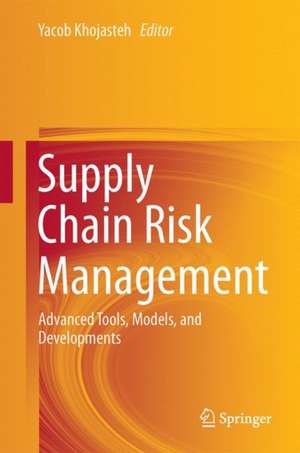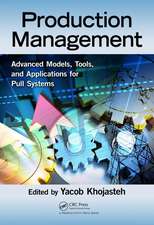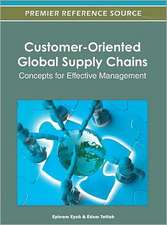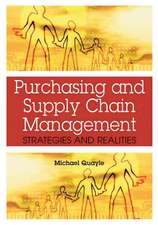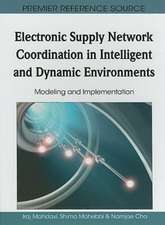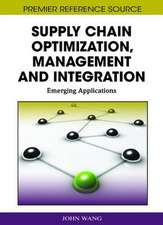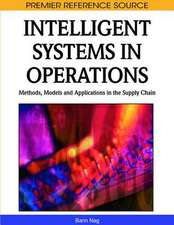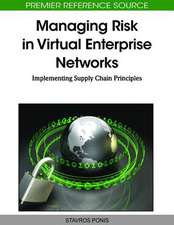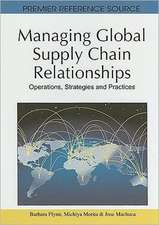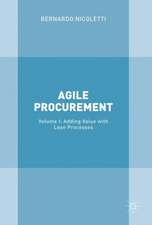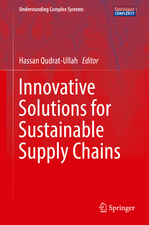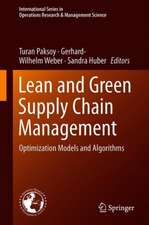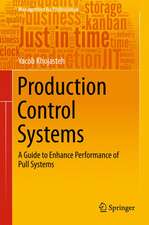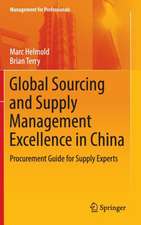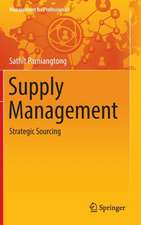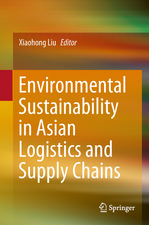Supply Chain Risk Management: Advanced Tools, Models, and Developments
Editat de Yacob Khojastehen Limba Engleză Hardback – 4 aug 2017
This book covers important issues related to managing supply chain risks from various perspectives. Supply chains today are vulnerable to disruptions with a significant impact on firms’ business and performance. The aim of supply chain risk management is to identify the potential sources of risks and implement appropriate actions in order to mitigate supply chain disruptions.
This book presents a set of models, frameworks, strategies, and analyses that are essential for managing supply chain risks. As a comprehensive collection of the latest research and most recent cutting-edge developments on supply chain risk and its management, the book is structured into three main parts: 1) Supply Chain Risk Management; 2) Supply Chain Vulnerability and Disruptions Management; and 3) Toward a Resilient Supply Chain. Leading academic researchers as well as practitioners have contributed chapters, combining theoretical findings and research results with a practical and contemporary view on how companies can manage the supply chain risks and disruptions, as well as how to create a resilient supply chain. This book can serve as an essential source for students and scholars who are interested in pursuing research or teaching courses in the rapidly growing area of supply chain risk management. It can also provide an interesting and informative read for managers and practitioners who need to deepen their knowledge of effective supply chain risk management.
This book presents a set of models, frameworks, strategies, and analyses that are essential for managing supply chain risks. As a comprehensive collection of the latest research and most recent cutting-edge developments on supply chain risk and its management, the book is structured into three main parts: 1) Supply Chain Risk Management; 2) Supply Chain Vulnerability and Disruptions Management; and 3) Toward a Resilient Supply Chain. Leading academic researchers as well as practitioners have contributed chapters, combining theoretical findings and research results with a practical and contemporary view on how companies can manage the supply chain risks and disruptions, as well as how to create a resilient supply chain. This book can serve as an essential source for students and scholars who are interested in pursuing research or teaching courses in the rapidly growing area of supply chain risk management. It can also provide an interesting and informative read for managers and practitioners who need to deepen their knowledge of effective supply chain risk management.
| Toate formatele și edițiile | Preț | Express |
|---|---|---|
| Paperback (1) | 1110.24 lei 6-8 săpt. | |
| Springer Nature Singapore – 16 feb 2019 | 1110.24 lei 6-8 săpt. | |
| Hardback (1) | 1116.40 lei 6-8 săpt. | |
| Springer Nature Singapore – 4 aug 2017 | 1116.40 lei 6-8 săpt. |
Preț: 1116.40 lei
Preț vechi: 1361.46 lei
-18% Nou
Puncte Express: 1675
Preț estimativ în valută:
213.69€ • 232.19$ • 179.62£
213.69€ • 232.19$ • 179.62£
Carte tipărită la comandă
Livrare economică 21 aprilie-05 mai
Preluare comenzi: 021 569.72.76
Specificații
ISBN-13: 9789811041051
ISBN-10: 9811041059
Pagini: 371
Ilustrații: XI, 334 p. 86 illus., 50 illus. in color.
Dimensiuni: 155 x 235 mm
Greutate: 0.66 kg
Ediția:1st ed. 2018
Editura: Springer Nature Singapore
Colecția Springer
Locul publicării:Singapore, Singapore
ISBN-10: 9811041059
Pagini: 371
Ilustrații: XI, 334 p. 86 illus., 50 illus. in color.
Dimensiuni: 155 x 235 mm
Greutate: 0.66 kg
Ediția:1st ed. 2018
Editura: Springer Nature Singapore
Colecția Springer
Locul publicării:Singapore, Singapore
Cuprins
Part I: Supply Chain Risk Management.- Chapter 1: Supply Chain Risk Management: A Comprehensive Review.- Chapter 1: Supply Chain Risk Management: A Comprehensive Review.- Chapter 3: Modeling Risk Emergence and Propagation in Buyer-Supplier-Customer Relationships.- Chapter 4: Managing Reputational Risks in Supply Chains.- Chapter 5: Managing IT and Cyber Risks in Supply Chains.- Chapter 6: Developing Supply Chain Risk Mitigation Strategies.- Part II: Supply Chain Vulnerability and Disruptions Management.- Chapter7: Analyzing Supply Chain Vulnerability through Simulation.- Chapter 8: Supply Chain Disruptions Preparedness Measures Using a Dynamic Model.- Chapter 9: A Quantitative Model for Analyzing Market Response during Supply Chain Disruptions.- Chapter 10: Supply Chain Risk Management in the Transmission and Amplification of Disruptions.- Chapter 11: Strategic Sourcing Under Supply Disruption Risk.- Chapter 12: Design and Evaluation of Global Supply Chain Considering Disruption Risk.- Part III: Toward a Resilient Supply Chain.- Chapter 13: Supply Chain Resiliency: A Review.- Chapter 14: The Role of Resiliency in Managing Supply Chains Disruptions.- Chapter 15: Designing Resilience into Service Supply Chains: A Conceptual Methodology.- Chapter 16: Resiliency in Supply Chain Systems: A Triadic Framework using Family Resilience Model.- Chapter 17: Cultivating Supply Chain Agility: Managerial Actions Derived From Established Antecedents.- Chapter 18: Assessing Supply Chain Resilience upon Critical Infrastructure Disruptions: A Multilevel Simulation Modelling Approach.
Notă biografică
Dr. Yacob Khojasteh is an Associate Professor of Operations Management at the Graduate Program in Business and Development Studies, Sophia University, Tokyo, Japan. He received his Ph.D. in Engineering from the University of Tsukuba, Japan. He also received his M.Sc. in Policy and Planning Sciences, and in Industrial Engineering from the University of Tsukuba, and Tarbiat Modares University, respectively. He has several years of professional experience in industry and consulting. His first book entitled “Production Control Systems: A Guide to Enhance Performance of Pull Systems” was published by Springer in 2016. His research interests include production and operations management, supply chain management, systems modeling and optimization, and lean production systems.
Textul de pe ultima copertă
This book covers important issues related to managing supply chain risks from various perspectives. Supply chains today are vulnerable to disruptions with a significant impact on firms’ business and performance. The aim of supply chain risk management is to identify the potential sources of risks and implement appropriate actions in order to mitigate supply chain disruptions.
This book presents a set of models, frameworks, strategies, and analyses that are essential for managing supply chain risks. As a comprehensive collection of the latest research and most recent cutting-edge developments on supply chain risk and its management, the book is structured into three main parts: 1) Supply Chain Risk Management; 2) Supply Chain Vulnerability and Disruptions Management; and 3) Toward a Resilient Supply Chain. Leading academic researchers as well as practitioners have contributed chapters, combining theoretical findings and research results with a practical and contemporary viewon how companies can manage the supply chain risks and disruptions, as well as how to create a resilient supply chain.
This book can serve as an essential source for students and scholars who are interested in pursuing research or teaching courses in the rapidly growing area of supply chain risk management. It can also provide an interesting and informative read for managers and practitioners who need to deepen their knowledge of effective supply chain risk management.
This book presents a set of models, frameworks, strategies, and analyses that are essential for managing supply chain risks. As a comprehensive collection of the latest research and most recent cutting-edge developments on supply chain risk and its management, the book is structured into three main parts: 1) Supply Chain Risk Management; 2) Supply Chain Vulnerability and Disruptions Management; and 3) Toward a Resilient Supply Chain. Leading academic researchers as well as practitioners have contributed chapters, combining theoretical findings and research results with a practical and contemporary viewon how companies can manage the supply chain risks and disruptions, as well as how to create a resilient supply chain.
This book can serve as an essential source for students and scholars who are interested in pursuing research or teaching courses in the rapidly growing area of supply chain risk management. It can also provide an interesting and informative read for managers and practitioners who need to deepen their knowledge of effective supply chain risk management.
Caracteristici
Presents topics on the evaluation, modelling, and control of supply chain risks Provides the state-of-the-art developments in managing supply chain risks Includes up-to-date academic research findings to mitigate supply chain disruptions Includes supplementary material: sn.pub/extras
